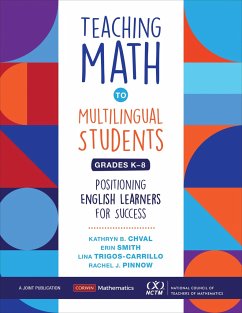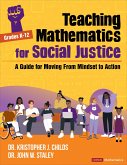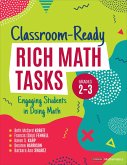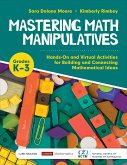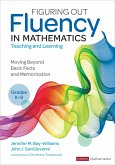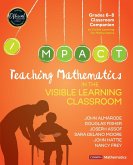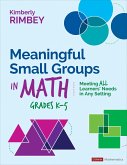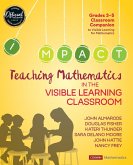Kathryn Chval (University of Missouri, Columbia, MO, USA), Erin Marie Smith (USA The University of Southern Mississippi), Lina Trigos-Carrillo (Colombia Universidad de La Sabana)
Teaching Math to Multilingual Students, Grades K-8
Positioning English Learners for Success
Kathryn Chval (University of Missouri, Columbia, MO, USA), Erin Marie Smith (USA The University of Southern Mississippi), Lina Trigos-Carrillo (Colombia Universidad de La Sabana)
Teaching Math to Multilingual Students, Grades K-8
Positioning English Learners for Success
- Broschiertes Buch
- Merkliste
- Auf die Merkliste
- Bewerten Bewerten
- Teilen
- Produkt teilen
- Produkterinnerung
- Produkterinnerung
Using strengths-based approaches to support development in mathematics It's time to re-imagine what's possible and celebrate the brilliance multilingual learners bring to today's classrooms. Innovative teaching strategies can position these learners as leaders in mathematics. Yet, as the number of multilingual learners in North American schools grows, many teachers have not had opportunities to gain the competencies required to teach these learners effectively, especially in disciplines such as mathematics. Multilingual learners-historically called English Language Learners-are expected to…mehr
Andere Kunden interessierten sich auch für
![Teaching Mathematics for Social Justice, Grades K-12 Teaching Mathematics for Social Justice, Grades K-12]() Kristopher J. ChildsTeaching Mathematics for Social Justice, Grades K-1236,99 €
Kristopher J. ChildsTeaching Mathematics for Social Justice, Grades K-1236,99 €![Classroom-Ready Rich Math Tasks, Grades 2-3 Classroom-Ready Rich Math Tasks, Grades 2-3]() Beth McCord KobettClassroom-Ready Rich Math Tasks, Grades 2-347,99 €
Beth McCord KobettClassroom-Ready Rich Math Tasks, Grades 2-347,99 €![Mastering Math Manipulatives, Grades K-3 Mastering Math Manipulatives, Grades K-3]() Sara Delano Moore (Mathematics Consultant)Mastering Math Manipulatives, Grades K-346,99 €
Sara Delano Moore (Mathematics Consultant)Mastering Math Manipulatives, Grades K-346,99 €![Figuring Out Fluency in Mathematics Teaching and Learning, Grades K-8 Figuring Out Fluency in Mathematics Teaching and Learning, Grades K-8]() Jennifer M. Bay-Williams (KY University of Louisville)Figuring Out Fluency in Mathematics Teaching and Learning, Grades K-846,99 €
Jennifer M. Bay-Williams (KY University of Louisville)Figuring Out Fluency in Mathematics Teaching and Learning, Grades K-846,99 €![Teaching Mathematics in the Visible Learning Classroom, Grades 6-8 Teaching Mathematics in the Visible Learning Classroom, Grades 6-8]() John T. AlmarodeTeaching Mathematics in the Visible Learning Classroom, Grades 6-836,99 €
John T. AlmarodeTeaching Mathematics in the Visible Learning Classroom, Grades 6-836,99 €![Meaningful Small Groups in Math, Grades K-5 Meaningful Small Groups in Math, Grades K-5]() Kimberly RimbeyMeaningful Small Groups in Math, Grades K-547,99 €
Kimberly RimbeyMeaningful Small Groups in Math, Grades K-547,99 €![Teaching Mathematics in the Visible Learning Classroom, Grades 3-5 Teaching Mathematics in the Visible Learning Classroom, Grades 3-5]() John T. Almarode (USA James Madison University)Teaching Mathematics in the Visible Learning Classroom, Grades 3-537,99 €
John T. Almarode (USA James Madison University)Teaching Mathematics in the Visible Learning Classroom, Grades 3-537,99 €-
-
-
Using strengths-based approaches to support development in mathematics It's time to re-imagine what's possible and celebrate the brilliance multilingual learners bring to today's classrooms. Innovative teaching strategies can position these learners as leaders in mathematics. Yet, as the number of multilingual learners in North American schools grows, many teachers have not had opportunities to gain the competencies required to teach these learners effectively, especially in disciplines such as mathematics. Multilingual learners-historically called English Language Learners-are expected to interpret the meaning of problems, analyze, make conjectures, evaluate their progress, and discuss and understand their own approaches and the approaches of their peers in mathematics classrooms. Thus, language plays a vital role in mathematics learning, and demonstrating these competencies in a second (or third) language is a challenging endeavor. Based on best practices and the authors' years of research, this guide offers practical approaches that equip grades K-8 teachers to draw on the strengths of multilingual learners, partner with their families, and position these learners for success. Readers will find: ¿ A focus on multilingual students as leaders ¿ A strength-based approach that draws on students' life experiences and cultural backgrounds ¿ An emphasis on maintaining high expectations for learners' capacity for mastering rigorous content ¿ Strategies for representing concepts in different formats ¿ Stop and Think questions throughout and reflection questions at the end of each chapter ¿ Try It! Implementation activities, student work examples, and classroom transcripts With case studies and activities that provide a solid foundation for teachers' growth and exploration, this groundbreaking book will help teachers and teacher educators engage in meaningful, humanized mathematics instruction.
Produktdetails
- Produktdetails
- Corwin Mathematics Series
- Verlag: SAGE Publications Inc
- Seitenzahl: 248
- Erscheinungstermin: 12. April 2021
- Englisch
- Abmessung: 215mm x 275mm x 22mm
- Gewicht: 572g
- ISBN-13: 9781071810842
- ISBN-10: 1071810847
- Artikelnr.: 60106188
- Herstellerkennzeichnung
- Libri GmbH
- Europaallee 1
- 36244 Bad Hersfeld
- gpsr@libri.de
- Corwin Mathematics Series
- Verlag: SAGE Publications Inc
- Seitenzahl: 248
- Erscheinungstermin: 12. April 2021
- Englisch
- Abmessung: 215mm x 275mm x 22mm
- Gewicht: 572g
- ISBN-13: 9781071810842
- ISBN-10: 1071810847
- Artikelnr.: 60106188
- Herstellerkennzeichnung
- Libri GmbH
- Europaallee 1
- 36244 Bad Hersfeld
- gpsr@libri.de
Kathryn B. Chval, Ph.D., is the Dean of the College of Education at the University of Missouri. She is a Professor of Mathematics Education and holds the Joanne H. Hook Dean's Chair in Educational Renewal. Chval began her career teaching in elementary schools. Her commitment to educational solutions in mathematics education is rooted in her early experiences in under-resourced schools in the U.S. Her research focuses on effective preparation models and support structures for mathematics and science teachers, effective elementary mathematics teaching for English language learners, and curriculum standards and policies. She is an expert on teacher education, curriculum development, and the study of effective learning environments. Chval has authored or co-authored more than 70 publications and made numerous presentations. Her leadership, research, and service have been recognized with several awards and honors, including the 2018 TODOS Iris M. Carl Leadership and Equity Award. Erin Smith, Ph.D., is an assistant professor in the School of Education at The University of Southern Mississippi in Hattiesburg, MS. She is a member of the National Council of Teachers of Mathematics, TODOS: Mathematics for ALL, and the American Educational Research Association. Her research focuses on increasing access to high quality mathematics education for emergent multilinguals, specifically in elementary grades. She has contributed to chapters in Access and Equity: Promoting High-Quality Mathematics in Grades 3-5 and Toward Equity and Social Justice in Mathematics Education. In addition, she has multiple articles under review at peer-reviewed research and practitioner journals. Lina Trigos-Carrillo, Ph.D., is the Chair of the Department of Psychology of Education and Development of Universidad de la Sabana in Colombia. She obtained a Ph.D. in Learning, Teaching and Curriculum with an emphasis on Literacy Education from the University of Missouri. Her research focuses on critical sociocultural perspectives to writing and community/family literacy of minorities and emergent bilinguals across the Americas. In her prior post-doctoral position in the SEE-TEL project, she facilitated parent engagement initiatives, professional development, and program evaluation. Rachel J. Pinnow, Ph.D., is an associate professor in the College of Education at the University of Missouri in Columbia. She is a member of the American Association for Applied Linguistics (AAAL). Her research focuses on second language acquisition, classroom interaction, multimodal communication and analysis, and social semiotics. She has contributed to peer-reviewed research journals such as Linguistics and Education, Anthropology & Education Quarterly, Mathematics Education Research Journal, Journal of Teaching for Excellence and Equity in Mathematics, and practitioner journals such as the Teaching Children Mathematics. In addition, she has contributed to chapters in Access and Equity: Promoting High-Quality Mathematics in Grades 3-5 and Common Core State Standards in Mathematics for English Language Learners: Grades K-8.
Preface Acknowledgements Our Hope for Multilingual Learners Teachers Who Inspire Studying Teacher Practice Interacting With Multilingual Learners and Their Families Position Multilingual Learners as Classroom Leaders What Research says About Positioning Reflecting of Xiao Li
s Experience Reflecting on Nabil Abadi
s Experience Reflecting on José López's Experience Positioning Students as Experts One Year Later Reflecting on Why Positioning Matters Recognize How Teachers Position Students Positioning Multilingual Learners as Leaders Explicitly Positioning Multilingual Learners as Leaders Implicitly Positioning Multilingual Learners as Leaders Strategies for Positioning Multilingual learners as Leaders Thinking About Positioning in Your Practice Facilitate Multilingual Learners
Participation in Mathematics Classroom Reflecting on Your Experience with Participating What Research Says About Student Participation Factors That Influence the Participation of Multilingual Learners Reflecting on Your Experiences with Fear Overcoming Fear Encountering Unknown Contexts Examining Teaching Strategies That Influence Participation Strategies for Facilitating Multilingual Learners' Participation in Mathematics Thinking About Participation in Your Practice Facilitate Partnerships Between Multilingual Learners and Their Peers Solving a Mathematics Problem with A Partner Solving a Mathematics Problem with A Partner Qualities of Partnerships Strategies for Facilitating Partnerships Establish Participation Norms With Students Practice Compliments Provide Concrete Resources Pay Attention To Pairing Monitor How Partners Work Revisit Partnership Norms With Student Thinking About Partnerships in Your Practice Engage Multilingual Learners Through Culturally-Relevant Contexts Reflecting on the Challenge of Contexts and Culture What the Research Says About Contexts in Mathematics Strategies for Engaging Multilingual Learners Through Culturally-Meaningful Contexts Thinking about Contexts in your Practice Reach Multilingual Learners with Visuals, Illustrations, and Gestures What Research Says About Visuals and Gestures Using Visuals Strategically Examining Ms. Bristow's Use of Visuals: Dividing Cookies Examining Ms. Bristow's Use of Visuals: Emphasizing the Meaning of 'Loose' Emphasizing Mathematical Connections Reflecting on Your Use of Gestures Using Gestures Strategically Examining Ms. Bristow's Use of Gestures: Obstacle Course Examining Ms. Bristow's Strategic Use of Visuals and Gestures: Columns and Rows Thinking About Visuals and Gestures in Your Practice Strategies for Using Visuals and Gestures Analyze Mathematical Work of Multilingual Learners Reflecting on Your Experiences What Research Says About Analyzing Multilingual Learners' Mathematical Work What Research Says About Analyzing Multilingual Learners' Mathematical Work Analyzing Additional Student Work Strategies for Discerning Between Mathematical and Language Issues Examining Abigail's Work Examining Janessa's Work The Importance of Interviewing Multilingual Learners Thinking About Analyzing Multilingual Learner's Mathematical Work in Your Practice Investigate Meanings to Enhance Multilingual Learners' Language Development The Importance of Academic Language for Multilingual Learners What the Research Says About Academic Language Distinguishing Between Multiple Meanings of Language Introducing Specialized Mathematics Language Amplified Use of Academic Language Strategies for Enhance Multilingual Learners' Language Development Thinking About Academic Language in Your Practice Use Your Discourse Strategically to Enhance Multilingual Learners' Opportunity to Learn Reflecting on Varieties of English that Influence Discourse What Research Says About Discourse Teacher Discourse Connecting Academic Language to Mathematical Representations Posing Questions to Engage Multilingual Learners Posing Questions to Engage Multilingual Learners Strategies for Promoting Classroom Discourse Thinking About Your Discourse in Your Practice Foster a Culture of Writing in the Mathematics Classroom Reflecting on Your Experiences What Research Says About Writing in Mathematics Establishing a Need to Write in Mathematics Establishing a Culture of Writing Providing Feedback on Students' Writing Analyzing Students' Writing Strategies for Fostering a Culture of Writing in Your Mathematics Classroom Reflecting on Mathematical Writing in Your Practice Develop Writing in Mathematics for Multilingual Learners Reflecting on Your Practice Mathematical Genres of Writing What the Research Says about Mathematical Genres Identifying Mathematical Writing Genres Strategies for Developing Writing in Mathematics for Multilingual Learners Teaching Practices Activities Reflecting on Your Use of Mathematical Genres in Your Practice Enhance Curriculum Materials for Multilingual Learners Reflecting on Mathematics Curriculum What Research Says About Curriculum Enhancement for Multilingual Learners Strategies for Crafting Language to Better Support Multilingual Learners Analyzing Curriculum Materials for Multilingual Learners Research Recommendations for Enacting Mathematics Curriculum Recognizing Different Mathematical Conventions and Representations Thinking about Mathematical Conventions and Representations in your Practice Thinking about Curriculum Enhancement in your Practice Engage with Parents and Families of Multilingual Learners Reflecting on Your Experiences What the Research Says about Multilingual Parent and Family Engagement Multicultural Parenting Styles Cultural Values Emphasizing the Value of Family in Your Classroom Examining Teachers' and Multilingual Parents' Expectations Reframing Multilingual Parental Engagement Strategies for Facilitating Multilingual Family and Parent Engagement in Your Classroom Reflecting on Family Engagement in Your Practice Appendix A. Additional Resources Appendix B. Selected Solutions References
s Experience Reflecting on Nabil Abadi
s Experience Reflecting on José López's Experience Positioning Students as Experts One Year Later Reflecting on Why Positioning Matters Recognize How Teachers Position Students Positioning Multilingual Learners as Leaders Explicitly Positioning Multilingual Learners as Leaders Implicitly Positioning Multilingual Learners as Leaders Strategies for Positioning Multilingual learners as Leaders Thinking About Positioning in Your Practice Facilitate Multilingual Learners
Participation in Mathematics Classroom Reflecting on Your Experience with Participating What Research Says About Student Participation Factors That Influence the Participation of Multilingual Learners Reflecting on Your Experiences with Fear Overcoming Fear Encountering Unknown Contexts Examining Teaching Strategies That Influence Participation Strategies for Facilitating Multilingual Learners' Participation in Mathematics Thinking About Participation in Your Practice Facilitate Partnerships Between Multilingual Learners and Their Peers Solving a Mathematics Problem with A Partner Solving a Mathematics Problem with A Partner Qualities of Partnerships Strategies for Facilitating Partnerships Establish Participation Norms With Students Practice Compliments Provide Concrete Resources Pay Attention To Pairing Monitor How Partners Work Revisit Partnership Norms With Student Thinking About Partnerships in Your Practice Engage Multilingual Learners Through Culturally-Relevant Contexts Reflecting on the Challenge of Contexts and Culture What the Research Says About Contexts in Mathematics Strategies for Engaging Multilingual Learners Through Culturally-Meaningful Contexts Thinking about Contexts in your Practice Reach Multilingual Learners with Visuals, Illustrations, and Gestures What Research Says About Visuals and Gestures Using Visuals Strategically Examining Ms. Bristow's Use of Visuals: Dividing Cookies Examining Ms. Bristow's Use of Visuals: Emphasizing the Meaning of 'Loose' Emphasizing Mathematical Connections Reflecting on Your Use of Gestures Using Gestures Strategically Examining Ms. Bristow's Use of Gestures: Obstacle Course Examining Ms. Bristow's Strategic Use of Visuals and Gestures: Columns and Rows Thinking About Visuals and Gestures in Your Practice Strategies for Using Visuals and Gestures Analyze Mathematical Work of Multilingual Learners Reflecting on Your Experiences What Research Says About Analyzing Multilingual Learners' Mathematical Work What Research Says About Analyzing Multilingual Learners' Mathematical Work Analyzing Additional Student Work Strategies for Discerning Between Mathematical and Language Issues Examining Abigail's Work Examining Janessa's Work The Importance of Interviewing Multilingual Learners Thinking About Analyzing Multilingual Learner's Mathematical Work in Your Practice Investigate Meanings to Enhance Multilingual Learners' Language Development The Importance of Academic Language for Multilingual Learners What the Research Says About Academic Language Distinguishing Between Multiple Meanings of Language Introducing Specialized Mathematics Language Amplified Use of Academic Language Strategies for Enhance Multilingual Learners' Language Development Thinking About Academic Language in Your Practice Use Your Discourse Strategically to Enhance Multilingual Learners' Opportunity to Learn Reflecting on Varieties of English that Influence Discourse What Research Says About Discourse Teacher Discourse Connecting Academic Language to Mathematical Representations Posing Questions to Engage Multilingual Learners Posing Questions to Engage Multilingual Learners Strategies for Promoting Classroom Discourse Thinking About Your Discourse in Your Practice Foster a Culture of Writing in the Mathematics Classroom Reflecting on Your Experiences What Research Says About Writing in Mathematics Establishing a Need to Write in Mathematics Establishing a Culture of Writing Providing Feedback on Students' Writing Analyzing Students' Writing Strategies for Fostering a Culture of Writing in Your Mathematics Classroom Reflecting on Mathematical Writing in Your Practice Develop Writing in Mathematics for Multilingual Learners Reflecting on Your Practice Mathematical Genres of Writing What the Research Says about Mathematical Genres Identifying Mathematical Writing Genres Strategies for Developing Writing in Mathematics for Multilingual Learners Teaching Practices Activities Reflecting on Your Use of Mathematical Genres in Your Practice Enhance Curriculum Materials for Multilingual Learners Reflecting on Mathematics Curriculum What Research Says About Curriculum Enhancement for Multilingual Learners Strategies for Crafting Language to Better Support Multilingual Learners Analyzing Curriculum Materials for Multilingual Learners Research Recommendations for Enacting Mathematics Curriculum Recognizing Different Mathematical Conventions and Representations Thinking about Mathematical Conventions and Representations in your Practice Thinking about Curriculum Enhancement in your Practice Engage with Parents and Families of Multilingual Learners Reflecting on Your Experiences What the Research Says about Multilingual Parent and Family Engagement Multicultural Parenting Styles Cultural Values Emphasizing the Value of Family in Your Classroom Examining Teachers' and Multilingual Parents' Expectations Reframing Multilingual Parental Engagement Strategies for Facilitating Multilingual Family and Parent Engagement in Your Classroom Reflecting on Family Engagement in Your Practice Appendix A. Additional Resources Appendix B. Selected Solutions References
Preface Acknowledgements Our Hope for Multilingual Learners Teachers Who Inspire Studying Teacher Practice Interacting With Multilingual Learners and Their Families Position Multilingual Learners as Classroom Leaders What Research says About Positioning Reflecting of Xiao Li
s Experience Reflecting on Nabil Abadi
s Experience Reflecting on José López's Experience Positioning Students as Experts One Year Later Reflecting on Why Positioning Matters Recognize How Teachers Position Students Positioning Multilingual Learners as Leaders Explicitly Positioning Multilingual Learners as Leaders Implicitly Positioning Multilingual Learners as Leaders Strategies for Positioning Multilingual learners as Leaders Thinking About Positioning in Your Practice Facilitate Multilingual Learners
Participation in Mathematics Classroom Reflecting on Your Experience with Participating What Research Says About Student Participation Factors That Influence the Participation of Multilingual Learners Reflecting on Your Experiences with Fear Overcoming Fear Encountering Unknown Contexts Examining Teaching Strategies That Influence Participation Strategies for Facilitating Multilingual Learners' Participation in Mathematics Thinking About Participation in Your Practice Facilitate Partnerships Between Multilingual Learners and Their Peers Solving a Mathematics Problem with A Partner Solving a Mathematics Problem with A Partner Qualities of Partnerships Strategies for Facilitating Partnerships Establish Participation Norms With Students Practice Compliments Provide Concrete Resources Pay Attention To Pairing Monitor How Partners Work Revisit Partnership Norms With Student Thinking About Partnerships in Your Practice Engage Multilingual Learners Through Culturally-Relevant Contexts Reflecting on the Challenge of Contexts and Culture What the Research Says About Contexts in Mathematics Strategies for Engaging Multilingual Learners Through Culturally-Meaningful Contexts Thinking about Contexts in your Practice Reach Multilingual Learners with Visuals, Illustrations, and Gestures What Research Says About Visuals and Gestures Using Visuals Strategically Examining Ms. Bristow's Use of Visuals: Dividing Cookies Examining Ms. Bristow's Use of Visuals: Emphasizing the Meaning of 'Loose' Emphasizing Mathematical Connections Reflecting on Your Use of Gestures Using Gestures Strategically Examining Ms. Bristow's Use of Gestures: Obstacle Course Examining Ms. Bristow's Strategic Use of Visuals and Gestures: Columns and Rows Thinking About Visuals and Gestures in Your Practice Strategies for Using Visuals and Gestures Analyze Mathematical Work of Multilingual Learners Reflecting on Your Experiences What Research Says About Analyzing Multilingual Learners' Mathematical Work What Research Says About Analyzing Multilingual Learners' Mathematical Work Analyzing Additional Student Work Strategies for Discerning Between Mathematical and Language Issues Examining Abigail's Work Examining Janessa's Work The Importance of Interviewing Multilingual Learners Thinking About Analyzing Multilingual Learner's Mathematical Work in Your Practice Investigate Meanings to Enhance Multilingual Learners' Language Development The Importance of Academic Language for Multilingual Learners What the Research Says About Academic Language Distinguishing Between Multiple Meanings of Language Introducing Specialized Mathematics Language Amplified Use of Academic Language Strategies for Enhance Multilingual Learners' Language Development Thinking About Academic Language in Your Practice Use Your Discourse Strategically to Enhance Multilingual Learners' Opportunity to Learn Reflecting on Varieties of English that Influence Discourse What Research Says About Discourse Teacher Discourse Connecting Academic Language to Mathematical Representations Posing Questions to Engage Multilingual Learners Posing Questions to Engage Multilingual Learners Strategies for Promoting Classroom Discourse Thinking About Your Discourse in Your Practice Foster a Culture of Writing in the Mathematics Classroom Reflecting on Your Experiences What Research Says About Writing in Mathematics Establishing a Need to Write in Mathematics Establishing a Culture of Writing Providing Feedback on Students' Writing Analyzing Students' Writing Strategies for Fostering a Culture of Writing in Your Mathematics Classroom Reflecting on Mathematical Writing in Your Practice Develop Writing in Mathematics for Multilingual Learners Reflecting on Your Practice Mathematical Genres of Writing What the Research Says about Mathematical Genres Identifying Mathematical Writing Genres Strategies for Developing Writing in Mathematics for Multilingual Learners Teaching Practices Activities Reflecting on Your Use of Mathematical Genres in Your Practice Enhance Curriculum Materials for Multilingual Learners Reflecting on Mathematics Curriculum What Research Says About Curriculum Enhancement for Multilingual Learners Strategies for Crafting Language to Better Support Multilingual Learners Analyzing Curriculum Materials for Multilingual Learners Research Recommendations for Enacting Mathematics Curriculum Recognizing Different Mathematical Conventions and Representations Thinking about Mathematical Conventions and Representations in your Practice Thinking about Curriculum Enhancement in your Practice Engage with Parents and Families of Multilingual Learners Reflecting on Your Experiences What the Research Says about Multilingual Parent and Family Engagement Multicultural Parenting Styles Cultural Values Emphasizing the Value of Family in Your Classroom Examining Teachers' and Multilingual Parents' Expectations Reframing Multilingual Parental Engagement Strategies for Facilitating Multilingual Family and Parent Engagement in Your Classroom Reflecting on Family Engagement in Your Practice Appendix A. Additional Resources Appendix B. Selected Solutions References
s Experience Reflecting on Nabil Abadi
s Experience Reflecting on José López's Experience Positioning Students as Experts One Year Later Reflecting on Why Positioning Matters Recognize How Teachers Position Students Positioning Multilingual Learners as Leaders Explicitly Positioning Multilingual Learners as Leaders Implicitly Positioning Multilingual Learners as Leaders Strategies for Positioning Multilingual learners as Leaders Thinking About Positioning in Your Practice Facilitate Multilingual Learners
Participation in Mathematics Classroom Reflecting on Your Experience with Participating What Research Says About Student Participation Factors That Influence the Participation of Multilingual Learners Reflecting on Your Experiences with Fear Overcoming Fear Encountering Unknown Contexts Examining Teaching Strategies That Influence Participation Strategies for Facilitating Multilingual Learners' Participation in Mathematics Thinking About Participation in Your Practice Facilitate Partnerships Between Multilingual Learners and Their Peers Solving a Mathematics Problem with A Partner Solving a Mathematics Problem with A Partner Qualities of Partnerships Strategies for Facilitating Partnerships Establish Participation Norms With Students Practice Compliments Provide Concrete Resources Pay Attention To Pairing Monitor How Partners Work Revisit Partnership Norms With Student Thinking About Partnerships in Your Practice Engage Multilingual Learners Through Culturally-Relevant Contexts Reflecting on the Challenge of Contexts and Culture What the Research Says About Contexts in Mathematics Strategies for Engaging Multilingual Learners Through Culturally-Meaningful Contexts Thinking about Contexts in your Practice Reach Multilingual Learners with Visuals, Illustrations, and Gestures What Research Says About Visuals and Gestures Using Visuals Strategically Examining Ms. Bristow's Use of Visuals: Dividing Cookies Examining Ms. Bristow's Use of Visuals: Emphasizing the Meaning of 'Loose' Emphasizing Mathematical Connections Reflecting on Your Use of Gestures Using Gestures Strategically Examining Ms. Bristow's Use of Gestures: Obstacle Course Examining Ms. Bristow's Strategic Use of Visuals and Gestures: Columns and Rows Thinking About Visuals and Gestures in Your Practice Strategies for Using Visuals and Gestures Analyze Mathematical Work of Multilingual Learners Reflecting on Your Experiences What Research Says About Analyzing Multilingual Learners' Mathematical Work What Research Says About Analyzing Multilingual Learners' Mathematical Work Analyzing Additional Student Work Strategies for Discerning Between Mathematical and Language Issues Examining Abigail's Work Examining Janessa's Work The Importance of Interviewing Multilingual Learners Thinking About Analyzing Multilingual Learner's Mathematical Work in Your Practice Investigate Meanings to Enhance Multilingual Learners' Language Development The Importance of Academic Language for Multilingual Learners What the Research Says About Academic Language Distinguishing Between Multiple Meanings of Language Introducing Specialized Mathematics Language Amplified Use of Academic Language Strategies for Enhance Multilingual Learners' Language Development Thinking About Academic Language in Your Practice Use Your Discourse Strategically to Enhance Multilingual Learners' Opportunity to Learn Reflecting on Varieties of English that Influence Discourse What Research Says About Discourse Teacher Discourse Connecting Academic Language to Mathematical Representations Posing Questions to Engage Multilingual Learners Posing Questions to Engage Multilingual Learners Strategies for Promoting Classroom Discourse Thinking About Your Discourse in Your Practice Foster a Culture of Writing in the Mathematics Classroom Reflecting on Your Experiences What Research Says About Writing in Mathematics Establishing a Need to Write in Mathematics Establishing a Culture of Writing Providing Feedback on Students' Writing Analyzing Students' Writing Strategies for Fostering a Culture of Writing in Your Mathematics Classroom Reflecting on Mathematical Writing in Your Practice Develop Writing in Mathematics for Multilingual Learners Reflecting on Your Practice Mathematical Genres of Writing What the Research Says about Mathematical Genres Identifying Mathematical Writing Genres Strategies for Developing Writing in Mathematics for Multilingual Learners Teaching Practices Activities Reflecting on Your Use of Mathematical Genres in Your Practice Enhance Curriculum Materials for Multilingual Learners Reflecting on Mathematics Curriculum What Research Says About Curriculum Enhancement for Multilingual Learners Strategies for Crafting Language to Better Support Multilingual Learners Analyzing Curriculum Materials for Multilingual Learners Research Recommendations for Enacting Mathematics Curriculum Recognizing Different Mathematical Conventions and Representations Thinking about Mathematical Conventions and Representations in your Practice Thinking about Curriculum Enhancement in your Practice Engage with Parents and Families of Multilingual Learners Reflecting on Your Experiences What the Research Says about Multilingual Parent and Family Engagement Multicultural Parenting Styles Cultural Values Emphasizing the Value of Family in Your Classroom Examining Teachers' and Multilingual Parents' Expectations Reframing Multilingual Parental Engagement Strategies for Facilitating Multilingual Family and Parent Engagement in Your Classroom Reflecting on Family Engagement in Your Practice Appendix A. Additional Resources Appendix B. Selected Solutions References

